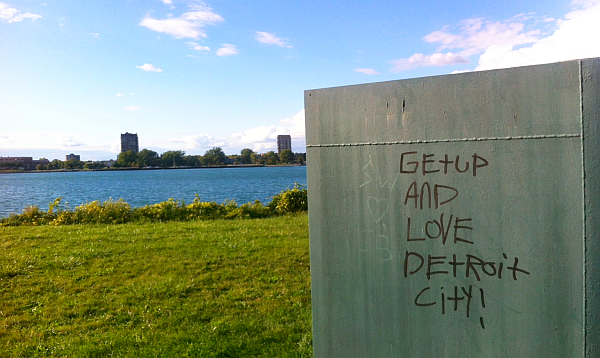Ain’t NOBODY happy ’bout this

Eclectagraphic by Anne C. Savage, special to Eclectablog
I’m on record as someone who supported Detroit going into bankruptcy from the very first days of that idea being discussed. As I pointed out in an op-ed at AnnArbor.com, Chapter 9 bankruptcy offers protections for a municipality that the imposition of an Emergency Manager does not. Namely, it protects democracy and prevents the selling off of municipal assets without the permission of elected leaders.
However, what Governor Snyder has managed to do is have his cake and eat it, too. He has the city of Detroit going through a bankruptcy process but, rather than the elected officials retaining control and making decisions on behalf of the city, he has an Emergency Manager to do that instead. It’s an end run around the intent of the Chapter 9 bankruptcy rules that was never anticipated when they were written.
That said, there was never any way that Detroit was going to extricate itself from its crushing debt owed to over 100,000 creditors without going through a bankruptcy. Anyone who thinks otherwise is fooling themselves. The legal costs of the thousands of lawsuits alone would have spelled the end for the city.
Now that federal bankruptcy judge Steven Rhodes has given the green light to the bankruptcy — the largest municipal bankruptcy in the history of the USA — much of what happens now is up to him. He said today that city retiree pensions are on the table though he hasn’t said they will be cut for sure. Given that these legacy costs, which include retiree health care, make up roughly 39% of the city’s annual revenue, it’s not particularly surprising that he left them on the table. However, making retirees pay for the poor decisions made by past city officials is an outrageous act made even more outrageous by the fact that it is in direct violation of the state constitution.
I agree wholeheartedly with this bit from today’s Detroit Free Press editorial:
Generations of leaders, both city and union, signed off on contracts that promised benefits no one could have believed were possible. In lieu of salary increases, pension sweeteners and health care bumps were offered. And once these devil’s bargains were in place, the city’s retirement boards made bad investments and engaged in unwise practices.Little of this is the fault of the 21,000 retirees for whom these meager pension checks mean the difference between satiety and hunger, medicine and electricity, comfort and poverty.
We believe that the protections afforded pensions in the state constitution mean something. Rhodes noted that simply because pensions can be cut in bankruptcy doesn’t mean he’ll approve a plan with steep cuts. And it’s important to note that any proposed cuts to pensions would affect the unfunded portion of the retirement systems, not the total pension payout.
If, to create a financially stable city, pensions must be cut, so be it. But pensioners must be made whole. And because this is a state-afforded protection, this responsibility falls to Gov. Rick Snyder and the Michigan Legislature. No less an advocate than Michigan Attorney General Bill Schuette has said that pensions must be protected. Heed his advice, governor, and respect the state constitution.
And most important, fix Detroit.
Fix Detroit, indeed.
I’m heartened by a couple of things that were said today. First, Judge Rhodes seemed to dismiss a fire sale of Detroit Institute of Arts treasures, saying:
When the expenses of an enterprise exceed its revenue, a one-time infusion of cash, whether from an asset sale or borrowing, only delays inevitable financial failure unless the enterprise reduces expenses or enhances income.
This suggests that, unlike the Snyder administration and our Republican “leaders” in the legislature, Judge Rhodes sees the importance of constructing something better in Detroit rather than emphasizing the Emergency Manager’s role as a deconstructor. There is no amount of cutting that will get the city out of its crisis and the sooner we all acknowledge that, the sooner we can get about the business of fixing Detroit.
Emergency Manager Kevyn Orr’s rhetoric has the right tone, as well:
Time is of the essence, and we will continue to move forward as quickly and efficiently as possible. We hope all parties will work together to help us develop a realistic restructuring plan that improves the financial condition of Detroit and the lives of its 700,000 citizens.
I’m happy to hear Orr mentioning the citizens of Detroit rather than the thousands of creditors. Those citizens should be at the top of any priority list. Unfortunately, while he makes statements like this, he also seems perfectly willing to cut the pension benefits of the thousands of innocent retirees who live check to check on a pension they have counted on for their retirement. When a huge bank takes a “haircut” in a bankruptcy, they write it off and continue on with their business. When a retiree’s income is cut, they miss meals. They can’t buy medicine. They lose their homes. Their lives are impacted in ways that most of us can’t imagine.
As the Free Press editorial says, these people must be made whole and the onus for that lies with our state government. The state can not sit idly by watching Detroit circle the drain with vultures circling overhead and not do right by its residents, including its retirees. And, so far, they have done almost nothing to help the city other than install an Emergency Manager and commit a token amount of financial assistance.
Too much of the debate around Detroit’s bankruptcy seems to center on workers and retirees, as if they alone brought the city to its knees. The reality is far more complex than that and this argument blithely ignores the economic tsunami that washed into Detroit and then dragged its epic manufacturing base back out into the sea with it, leaving a shrinking population, a badly eroded infrastructure, and years of pretending that we could solve Detroit’s problems by blaming it all on unions and corruption.
Had real investment taken place in Detroit several decades ago, the sort of investment that would enable its keen entrepreneuring spirit to flourish, much of the current pain could have been avoided. But, all too often, our state’s leaders didn’t want to involve themselves with Detroit and Detroit made that easy by being prickly and stubborn, too proud to receive outside help. While it was down, the city was mugged and kicked in the teeth by rapacious thieves like Kwame Kilpatrick and a host of other corrupt people with the power to harvest for themselves whatever treasure they could lay their hands on before moving on.
The large manufacturers have mud on their hands, too. They used up the lifeblood of Detroit to build their companies and then left it high and dry when they could find cheaper labor in other countries. They felt no pangs of guilt when they consigned the city to an unemployment rate treble that of the rest of the country.
But, here’s what I know about Detroit: it’s got good bones. All of the things that made Detroit great are still here. It sits on a major waterway and at the nexus of countless highways. More importantly, it’s got a boundless spirit to survive that won’t die. Our focus now should be on rebuilding and recreating, not cutting and tearing down. While blight removal is essential, we must also ensure that the majesty of Detroit isn’t also removed. While new infusions of investment and development are critical, it must never be at the expense of the hardy souls who toughed it out and continue to live, work, play, and survive in Motown. We need to empower the thousands of entrepreneurs who live there and give them a solid role in what ever comes next for the city.
Detroit’s comeback should never be at the expense of its residents and to the sole profit of outside developers.
Dealing with over 100,000 creditors is going to be excruciating. There will be lawsuits. There will be intense acrimony. Everybody will come away with less than they want. These are simple, undeniable truths. But, at the end of the process, Detroit must come out of it with its soul and its spirit intact, ready for the future. We must equip it with the tools it needs to rebuild and work in true partnership moving forward.
Once the bankruptcy is over, there will have been enough cutting. It will be time to build.
I’m an eternal optimist and I love Detroit. I hope everyone involved can find a piece of that in themselves.

[Photo by Chris Savage | Eclectablog]



